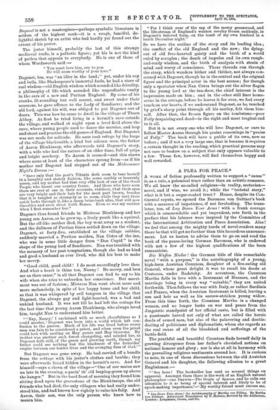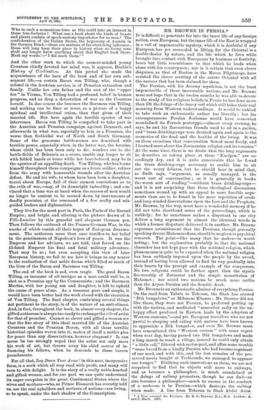A PLEA. FOR PEACE.*
A WORK of fiction professedly written to support a " cause " is, as a rule, a polemical tract rather than an artistic romance.
We all know the so-called religious—in reality, sectarian— novel, and if wise, we avoid it ; while the "teetotal story," what is it but a sugar-coated tract ? Hence, despite its Con-
tinental repute, we opened the Baroness von Suttner's book with a measure of impatience, if not foreboding. The trans- lator, too, of Lay Down Your Arms ! with a frank courage
which is commendable and yet imprudent, sets forth in the preface that his labours were inspired by the Committee of the International Arbitration and Peace Association. Alas ! we feel that among the mighty horde of novel-readers many there be that will get no further than this hazardous announce- ment. Let us hasten to advise them to go on and read the book of the peace-loving German Baroness, who is endowed with not a few of the highest qualifications of the born romanticist.
Die Waren Nieder ! the German title of this remarkable
novel "with a purpose," is the autobiography of a young, high-born Austrian Countess, daughter of a fire-eating old General, whose great delight it was to recall his deeds at Custozza, under Radetzky. At seventeen, the Countess Martha falls in love with a lieutenant of Hussars, and the marriage being in every way " suitable," they are united forthwith. Then follows the war with Italy, or rather Sardinia and France, when the Austrian lieutenant is killed, leaving a son and heir as well as his sorrow-stricken young widow. From this time forth, the Countess Martha is a changed woman, and no longer looks on war and peace from the Jingoistic standpoint of her official caste, but is filled with a passionate hatred not only of what are called the heroic deeds of armed men, but also of the palavering and double- dealing of politicians and diplomatists, whom she regards as the real cause of all the bloodshed and sufferings of the battle-field.
The youthful and beautiful Countess finds herself daily in growing divergence from her father's cherished notions on national honour and glory ; nor is she at all in harmony with the prevailing religious sentiments around her. It is curious to note, in one of these discussions between the old Austrian General and his daughter, the following allusion to a great Englishman :—
" See here ! The bookseller has sent us several things on approval. Amongst them there is the work of an English natural philosopher—one Darwin—The Origin of Species, and he calls our attention to it as being of special interest and likely to be of epoch-making importance.'—' My worthy friend must excuse me.
• Lay Down Your Arms / the Autobiography of Martha von Tilling. By Bertha Ton Buttner. Authorised Translation by T. Holmes, Revised by the Authoress. London: j.ongmans, Green, and Co. Who in such a momentous time as this could take an interest in these tom-fooleries ? What can a book about the kinds of beasts and plants contain of epoch-making importance for us men ? The confederation of the Italian States, the hegemony of Austria in the German Bund,—these are matters of far-stretching influence ; these will long keep their place in history when no living man shall any longer know anything about that English book there. Mark my words.'—' I did mark them.'"
And the other work to which the earnest-minded young Countess chiefly devoted her mind was, it appears, Buckle's
History of Civilisation. At this period she made the acquaintance of the hero of the book and of her own sub-
sequent life,—a certain Baron von Tilling, who, though a colonel in the Austrian service, is of Prussian extraction and family. Unlike her own father and the rest of the " upper ten" in Vienna, Von Tilling had a profound belief in human progress, and as deep a detestation of war as the Countess herself. In due course she becomes the Baroness von Tilling, and nothing can be finer or truer, as a picture of a happy spiritual and intellectual union, than that given of their married life. But here again the terrible spectre of war intervenes. Baron von Tilling is compelled to take part in the Austrian and Prussian campaign against Denmark, and afterwards in what was, especially to him as a Prussian, the worse than fraticidal war of North and South Germany. Some of the gruesome battle-scenes are described with terrible power, especially when, in the latter war, the heroine, whose child has been born only to die, wanders out to the battle-fields of Bohemia as a nurse, unable any longer to sit with folded hands at home while her best-beloved may be in the agonies of an appalling death. Von Tilling, who has borne himself throughout these campaigns as a brave soldier, retires from the army with honourable wounds after the Austrian defeat. He and his wife, to whom have been born a daughter, travel about Europe, full of their earnest convictions as to the evils of war,—nay, of its downright imbecility ; and con- vinced that a time was at hand when the masses of men would no longer be content to be mowed down by instruments of deadly precision at the command of a few crafty and mis- guided leaders and diplomatists.
They live for the most part in Paris, the Paris of the Second Empire; and bright and alluring is the picture drawn of la Ville-LumCere by this graceful and eloquent German pen. Then follows the outbreak of the Franco-German War, in the smoke of which vanish all their hopes of European disarma- ment. The authoress more than once testifies to her belief in the genuineness of Napoleon's love of peace. It was the Empress and her advisers, we are told, that forced on the ill-fated Emperor his final and fatal military adventure. That may be so ; but even accepting this view of later European history, we fail to see how it brings us any nearer to the realisation of that noble dream which filled so much of the lives of the Baron and Baroness von Tilling.
The.end of the book is sad, even tragic. The good Baron Tilling, as innocent of all intrigue as a man could well be, is shot as a Prussian spy by the Communists ; and the Baroness Martha, with her young son and daughter, is left to uphold the cause of peace alone. As a romance pure and simple, it would have been better had the work closed with the execution of Von Tilling. The final chapter, containing several things not pertinent to the story, is of the nature of an anti-climax. And, in fact, throughout the book, in almost every chapter, the
gifted authoress is always too ready to exchange the role of artist for that of preacher. Cannot so clever and gifted a woman see that the fine story of this ideal married life of the Austrian
Countess and the Prussian Baron, with all these terrible historical episodes woven into it, makes of itself a nobler plea for peace than any dissertations, however eloquent ? Ic can never be too strongly urged that the artist not only mars his work of art, but throws away his chief soarce of in- fluencing his fellows, when he descends to these barren preachments.
For all that, Lay Down Your Arms ! in this neat, inexpensive form, is a work which all may read with profit, and many will turn to with delight. It is the story of a really noble-hearted and gifted woman, and for our part we can quite understand its eager reception in the great Continental States where the wives and mothers—who, as Prince Bismarck has recently told us, are the real upholders and saviours of nations—are living, so to speak, under the dark shadow of the Conscription.



















































 Previous page
Previous page